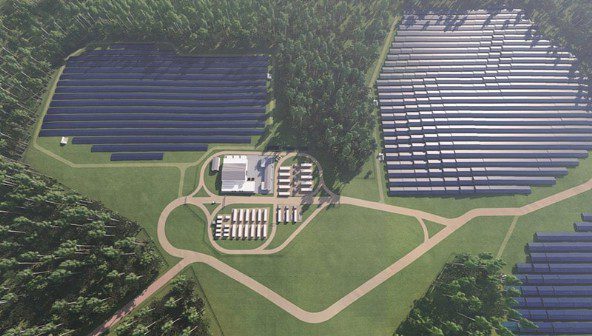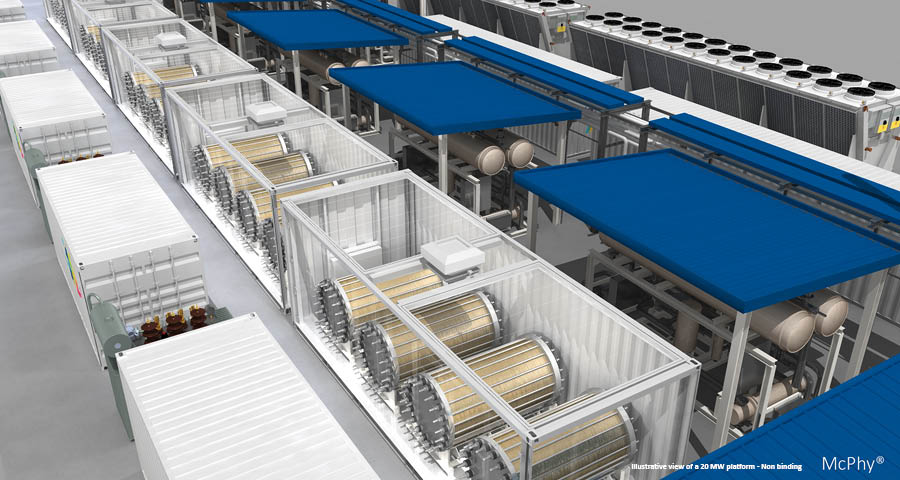
Hydrogene de France (HDF) Energy, an independent power producer and fuel cell manufacturer, has kicked off construction of one of the world’s first multi-megawatt baseload hydrogen power plants. The company says the project in French Guiana, which is being “duplicated” in about 20 countries, will provide 128 MWh of green hydrogen storage.

HDF Energy’s $ 200 million Centrale Electrique de l’Ouest Guyanais (CEOG) project is based on its proprietary power-to-power Renewstable power plant. The plant will comprise a solar PV park, a 16-MW electrolysis platform, a long-term hydrogen storage unit, two 1.5-MW fuel cell systems, as well as a short-term lithium-ion battery storage unit. When commissioned as planned in mid-2023, the plant will deliver a “fixed and guaranteed” power capacity of 10 MW between the hours of 8 a.m. and 8 p.m. and 3 MW between 8 p.m. and 8 a.m., it said.
The Renewstable power plant is essentially designed to produce 860 tons of green hydrogen per year through a 16-MW electrolysis platform using solar power. “The technology consists of separating the hydrogen and the oxygen from a water molecule (H20) using an electrical current inside an electrolyzer. The hydrogen obtained is pressurized and stored in adapted tanks. Hydrogen is later reunited with oxygen (from the air) inside a fuel cell. This generates electricity and steam only. The production of electricity, therefore, meets the demand from the consumers. These elements (electrolyzer, storage, fuel cell) put together constitute the hydrogen energy chain,” the company said.

Bordeaux, France–headquartered HDF Energy recently achieved financial close for the project, backed by equity from infrastructure fund Meridiam and petroleum operator SARA, a Rubis Group entity. The project will be built by Siemens Energy under an engineering, procurement, and construction (EPC) contract. McPhy, a firm that designs and produces high-pressure alkaline electrolyzers, will supply the 16-MW Augmented McLyzer high-power electrolyzer platform. According to McPhy, the “unique combination of high-pressure alkaline electrolysis (30 bar) and high current density electrodes will enable almost 860 tons of green hydrogen to be produced per year.”
McPhy noted the project will also be the first time that it will be offering an outdoor version of its alkaline electrolysis technology. “In addition to being the most suitable solution for an isolated geographical area, containerization ensures a high level of profitability for the customer. Indeed, the reduction in civil engineering costs and the pre-assembly of the equipment directly in McPhy’s plants, make it possible to optimize time and total installation and assembly costs,” the firm said.

HDF Energy will supply the two 1.5-MW proton exchange membrane (PEM) hydrogen fuel cells, which are based on Ballard’s core FCgen-LCS stack technology. According to Rob Campbell, Ballard’s chief commercial officer, the PEM technology is suited to utility power systems like CEOG because it meets these projects’ required proven reliability, dependability, and operating performance in heavy-duty applications. “Our stacks are expected to offer cost-effective scaling of energy storage and electricity regeneration, are optimal for daily cycling of operations, and are completely zero-emissions in this case due to the use of upstream renewable energy,” Campbell said.
HDF Energy said CEOG is currently being duplicated in about 20 countries such as Mexico, Caribbean island nations, Southern Africa, Indonesia, and Australia. HDF claims it has already identified a project pipeline of $ 3 billion.“The most mature part of this pipeline represents US$ 1.5 billion of investment,” it said.
In French Guiana, a French territory on the northern Atlantic Coast in South America, CEOG’s power production is supported by a 25-year power purchase agreement HDF Energy signed with French utility EDF on Sept. 29. “It is the first time that a renewable energy project supplies a grid through a capacity-based Power Purchase Agreement, usually used for thermal power plants,” the company noted. “This type of electricity offtake contract guarantees the availability and stability of the electricity produced by CEOG. This last characteristic is essential for powering isolated grids or reducing congestion on large networks.”
“The Renewstable solution addresses a very large market, being all grids that are currently powered by fossil fuel power plants,” explained Damien Havard, CEO of HDF Energy. “By supplying non-intermittent renewable energy, CEOG—which we are working to replicate across the world—opens a new era for renewable energies.”
HDF Energy’s focus on French Guiana responds to the territory’s power supply deficit, mainly in the west, which is seeing rapid population growth. “By providing several megawatts of guaranteed and non-polluting electricity, CEOG corresponds to the needs expressed in Guyana’s Pluriannual Energy Programming (PPE),” the company said.
CEOG will be located on a 140-hectare plot “on hilltops, thus avoiding lowland forests, which are rich in biodiversity,” HDF Energy said.
—Sonal Patel is a POWER senior associate editor (@sonalcpatel, @POWERmagazine).
The post Pioneering 10-MW Baseload Hydrogen Power Plant Breaks Ground in French Guiana appeared first on POWER Magazine.